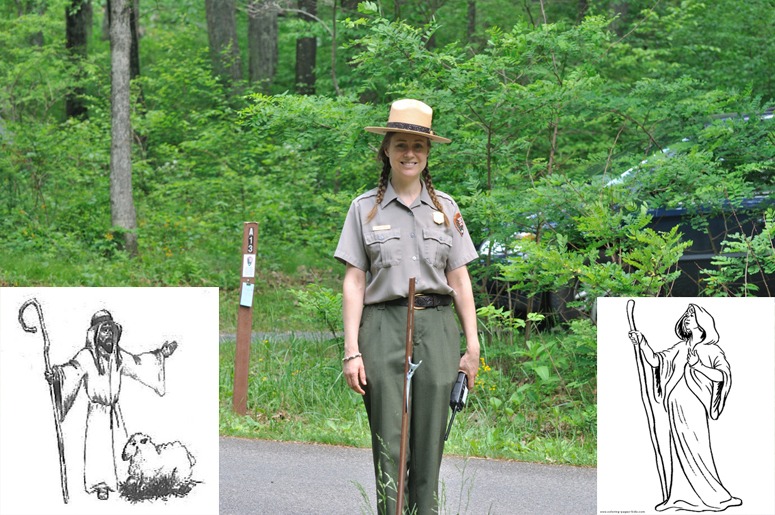Etymology provides the answer. ‘Ranger’ derives from the Middle French ranger ‘to arrange (soldiers) in ranks… to put oneself in rank or order’. Ranger came into English meaning ‘a forester, a gamekeeper, a keeper of a royal park (also as an honorary title). Now esp.: a warden of a national or state park or forest’. But do we want national and natural parks to be run by soldiers and, if so, who are they fighting? Wild animals? Visitors? I would prefer natural landscapes to be regarded as Sacred Space and tended by either holy men, like the druid (above right) or the good shepherd (above left). There should be a total ban on folksy signage and I do not like the connection with the hunting and pleasure parks of feudal barons. National parks should be national sanctuaries, preferably with no bitmac, motor vehicles or tourist ‘facilities’. This will not be an easy change to effect but a start can be made by employing staff dressed like hermits to protect the sacredness of natural areas (using ‘sacred’ in its pre-Christian sense of ‘set apart’).
Image of Shenandoah-National-Park courtesy Bill Spruce


Uniforms are for security and safety.
In an emergency situation, where the intervention of a park ranger is required, a uniformed employee in a silly costume stands out more readily from the crowds and may be easily and quickly identified. One may call some parks “national sanctuaries” but in fact they are destinations where accidents do happen and where visitors might fall ill.
I agree about the folksy signage but not with “holy men” as caretakers. That would reflect that our civilization is made up of a lot of spiritual people. And that is not so.
The Wiki entry on Rangers also emphasises security. My comments are (1) I certainly do not want people to be hurt or the land to be damaged (2) you need to protect people in a ‘park’ but I do not think all, or most, ‘natural areas’ should be called parks or run as parks. Many of them should be ‘nature reserves’ in which people take responsibility for their own safety. (3) I dislike the government agencies which market nature reserves as tourist destinations and which cause crowds to be present in these places (4) I love ‘wild swimming’ and do not enjoy being watched by lifeguards or told that the sea is too rough.
TS Eliot put it like this:
And when we were children, staying at the archduke’s,
My cousin’s, he took me out on a sled,
And I was frightened. He said, Marie,
Marie, hold on tight. And down we went.
In the mountains, there you feel free.
I read, much of the night, and go south in the winter.
Park Rangers dress that way for a very good historical reason. The National Parks were established some twenty years BEFORE the National Park Service in 1916. For the first 20 years there were no such things as rangers. So who ran the parks, you ask? The US Calvary. When the rangers took over, we wore the same (or very similar) uniforms to the Calvary, which the public was already used to seeing at Yellowstone, etc. What park rangers wear today is essentially a World War 1 Calvary officer’s uniform, with more modernized cut to the trousers and newer boots.
As for the gun belt and the rest of the modern police overlay, well we are federal (or state) cops. If you break the law at Yellowstone, a ranger will arrest you, not some city cop, but you’ll end up in jail all the same. It can be dangerous, a ranger at Mount Rainer, Margaret Anderson was shotgunned to death. She stopped a guy to remind him to out on his snow chains and he just blew her away. It’s every bit as dangerous as any police job, so weapons, body armor, radios and the rest are called for.
Hope that answers your question.
Ranger Bill
Thank you very much for the information. It is both very interesting and very useful to have. I am all in favour of the law being kept and the public being protected. But I am less keen on people wearing military-style uniforms when it is not essential to do so. That said, I find it difficult to know what style of ‘uniform’ would be more appropriate.